- Author Adrian Jeff jeff@psychologosportal.com.
- Public 2023-12-17 05:06.
- Last modified 2025-01-24 14:09.
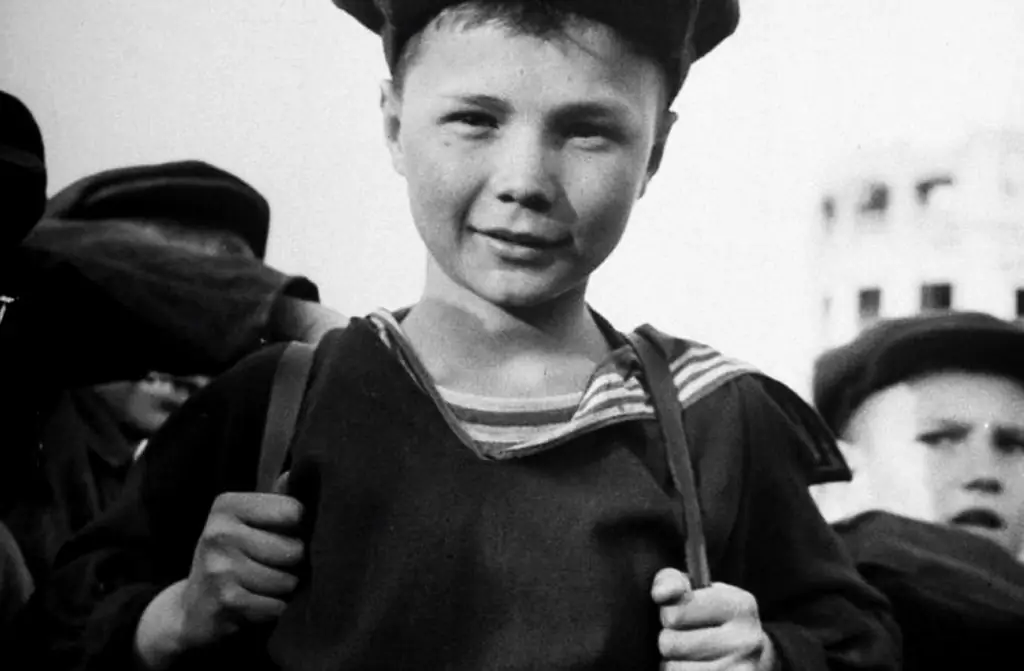
Orphanages yesterday and today. Heading for the abyss, potential for takeoff. Part 1
Today, quite satisfactory living conditions have been created in orphanages, as a rule, children receive everything necessary for their existence, including through the efforts of many charitable organizations. At the same time, going into adulthood, even having a starting point in the form of public housing, graduates of orphanages are not able to take care of themselves elementarily, to equip their life, find a job, and organize their leisure time.
Why is this happening? How to change the situation?
How it was - the Makarenko system
One of the main indicators of the efficiency of orphanages is the level of socialization of their graduates. In this regard, the data of the Prosecutor General's Office of the Russian Federation for 2005 are horrifying: only 10% of graduates of orphanages successfully socialize, 40% use alcohol or drugs, 40% break the law, and another 10% commit suicide …
The sad trend does not change, even if by 2009-2011 the number of orphans had almost halved due to the fact that more children were taken to foster families.
The situation is aggravated by the fact that when adult orphans who are unable to socialize become parents, their children turn into potential inmates of the same institutions.
Vicious circle
In the post-revolutionary and post-war years, millions of children turned out to be orphans and homeless children, and they later became the basis of a healthy Soviet society, almost completely found their place in life, got a profession, and created families. And these are the children of a country that rose from the ruins in all respects of the word.
There was no accommodation for children, nor a sufficient amount of food, clothing, footwear, medicines, staff and other things. Orphanage residents often had to work to provide themselves with everything they needed, in the literal sense of the word, to build their lives. Subsequently, most of them got a start in life and remembered their orphanage with warmth and gratitude.
Today, quite satisfactory living conditions have been created in orphanages, as a rule, children receive everything necessary for their existence, including through the efforts of many charitable organizations. At the same time, going into adulthood, even having a starting point in the form of public housing, graduates of orphanages are not able to take care of themselves elementarily, arrange their life, find a job, and organize their leisure time. Many do not even have such desires!
Psychologically, graduates of children's homes are extremely rarely developed to the level of a modern person. Often in adulthood, they manifest themselves at a primitive level - they continue to behave infantile, are unable to take responsibility for their lives, to make an important decision. Many go into adulthood with the confidence that everyone owes them due to their orphanhood and continue to use their position. Having never found their place in the life of society and having tried all possible methods of begging, such young people often end up in criminal circles, get drunk or die.
Why is there such a contrast between the orphanage yesterday and today? Causes? Solutions? Let's try to find answers in the psychological mechanisms of children's development in the context of the Russian mentality.
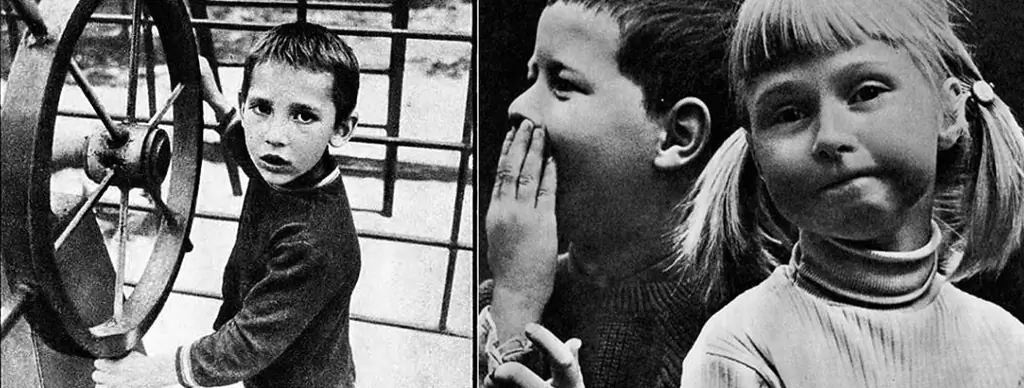
What happens to a child without a mother
The development of a baby directly depends on the main feeling of security and safety in his life, which should come from the mother or at least the person who replaces her. Only when there is a sense of security and safety, the process of psychological development starts.
A child is born already with a specific set of psychological properties that begin to manifest themselves from early childhood. They manifest themselves so far at the very initial, elementary level - directly. I feel the desire - I satisfy at all costs.
For example, a child with a skin vector, driven by the desire to "get", satisfies him in the simplest way - takes someone else's. Developing and becoming an adult, he realizes the same desire, "obtaining" material benefits for himself and others in a different way - he builds a business, becomes an engineer, an athlete, etc.
The period of childhood until the end of puberty is the time when innate psychological properties develop. Becoming an adult, a person is able to fully realize himself in society and enjoy his own life.
Losing a sense of security and safety at the time of the loss of parents, the child loses the ability to develop innate properties of the psyche. Feeling the world around him as hostile and dangerous, without a fulcrum, it is extremely difficult for a child to develop any of his qualities. For this reason, he often remains in an archetypal state, at the most primitive level of development. Although the chance for development remains for everyone until the end of puberty.
The street child turns into …
A child, which is so much needed in childhood, can potentially receive a child from another adult who replaces his mother, and even from a collective, as happened in the conditions of the Makarenko colonies or post-war orphanages.
Those homeless gangs into which abandoned children got lost in the post-war years were like the primitive flock of early people, who existed according to the laws of animal ranking. In such a pack, everyone clearly felt their place, knew their role in fulfilling a common task - to survive at all costs. The street kids also survived only because they stayed together. However, they survived in ways that were unacceptable for modern society.
When a group of children, built according to the same principles of natural ranking, got into the environment of collective labor and learning, where it was necessary to work together to obtain basic household goods, there was a significant breakthrough in the development of such children.
Personality education through the team
The urethral-muscular mentality of the Russian people, formed under the influence of special geopolitical factors for many centuries, forms a special mental superstructure in the psyche of every person who grew up in Russia, which sets us the landmarks characteristic of the owners of the urethral vector.
Therefore, the principles of upbringing, based on a sense of collectivism, joint work and responsibility for their comrades, harmoniously fit into the urethral-muscular mentality of Russian society.
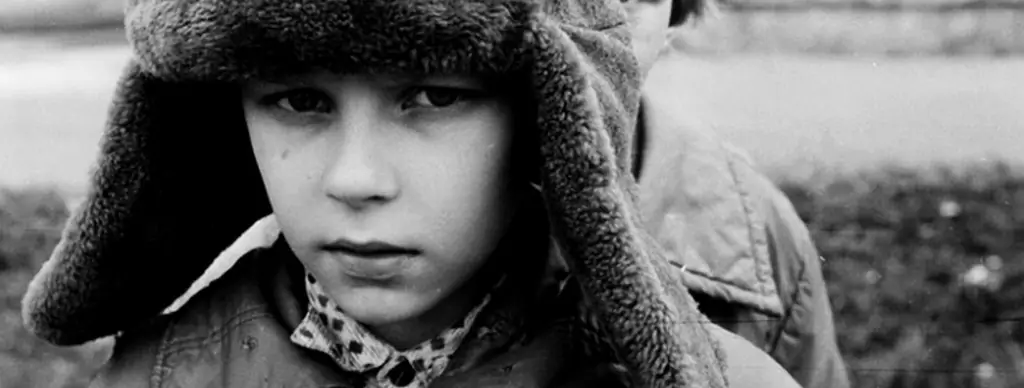
The main postulates of the Makarenko system are:
Team
“One for all and all for one” - it was this approach that found the very necessary response in the souls of little street children, which made the system of upbringing, education and socialization of Soviet orphanages effective.
Collective work, coexistence, training and work to achieve a common result made it possible for everyone to show and develop their inherent personal qualities, to do for the common good exactly the work that he knew how and loved most. Even the smallest contribution to the common cause gave the right to be aware of the collective victory, the work done, the result achieved.
The opportunity to feel like a part of the whole, when the child clearly understands that a group can achieve more than each individual, attached value to the team, forced to learn to interact, resolve conflicts and build relationships within the group.
Through such a "carrot" a sincere desire to learn and work in a team, to help others, to pull up those who are lagging behind and to take more responsibility for those who succeed, arose, and the foundation for future social responsibility was laid.
Self management
Carriers of the urethral mentality do not have a sense of limitations, they do not know how to obey them. For this reason, the imposition of strict internal rules in children's institutions, together with the absence of any right to vote in the child, finds the child's self-awareness like a scythe on a stone, provokes an instant protest and the desire to go contrary to the system. Makarenko's approach made everyone feel important.
On the other hand, the communality of the Russian people, due to the muscular component of the mentality, helped to resolve all issues together. The decision of the general meeting was obligatory for both pupils and teachers. The meetings determined common goals and objectives, the solution of which was achieved by the positive contribution of each Makarenza.
Each detachment was assigned a specific goal, and the process of achieving it was entrusted to the colonists themselves under the guidance of their commander. As a result, for each task, there was always a person who was able to perform it in the best way.
"Thanks to this, our colony was distinguished by 1926 by its striking ability to tune in and rebuild for any task, and to fulfill the individual details of this task there was always an abundance of cadres of capable and proactive organizers, managers, people on whom one could rely."
Labor education
Considering the post-war period and the urgent need to provide themselves with elementary conditions for life, physical labor was perceived by the colonists naturally and adequately at that time.
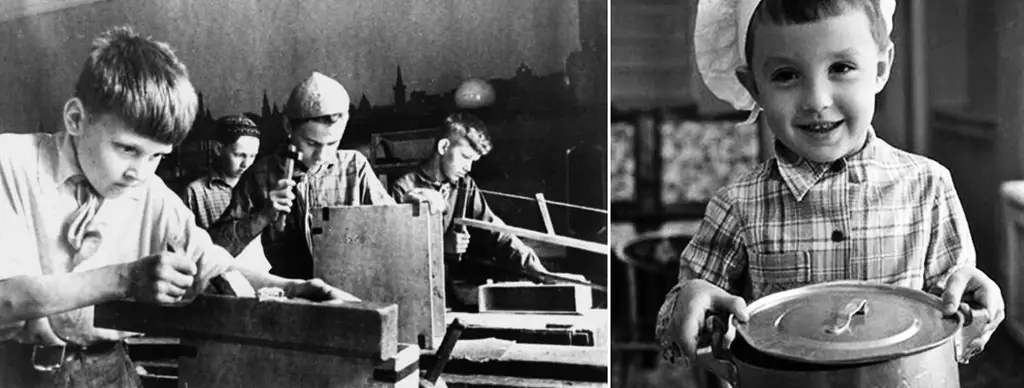
Today we have a distortion in the other direction, when any physical labor activity of a child is considered illegal. As a result, children from orphanages do not receive basic skills in self-service and housekeeping, do not know how to cook their own food, are unable to maintain cleanliness in the house, and do not take care of clothes. Girls cannot sew on a button, boys cannot hammer in a nail.
However, the essence of labor education was not even about getting everyday skills, but about performing joint activities to achieve a common result. So they together provided a system of security and safety on an adult basis. Joint work contributed to the creation of a team and its cohesion, made it possible to clearly see how everyone, to the best of his ability, works for a common goal.
The very participation of colonists in production work on an equal basis with adults (albeit to a lesser extent) changed the self-perception of adolescents, attached special value to their work and formed responsibility for the work performed. They understood that they were doing serious things, participating in the life of the colony, benefiting with their work, creating benefits for all their comrades.
"Responsibility for the bucket and the rag is for me the same lathe, even if it is the last in a row, but it is used to grind fasteners for the most important human attribute: a sense of responsibility."
Adult example
Without the help of adults, without outside influence on the children's collective, it is impossible to talk about any development of the psyche. On their own, children can only create archetypal flocks, which, in fact, were the gangs of street children. They may be able to survive, but they will not be able to develop.
Having a mentor, an authoritative adult, whose example would make you want to adopt him, is extremely important for the development of any child. The orphanage must know, among other things, that there are adults in the world who can be trusted.
This was Anton Semenovich Makarenko. His authority was in no way developed by total control, violence or fear, but by the ability to respect a person regardless of his age or social status. Pupils never perceived him as a boss. They considered him theirs in all respects, so they did not hesitate to ask for help or ask for advice.
Discipline as a moral category
"Our task is to cultivate correct habits, such habits, when we would act right not because we sat down and thought, but because we cannot otherwise, because we are so used to it."
Internal discipline was harmoniously built into the value system of the colonists on the basis of an innate sense of justice and mercy as properties of the urethral mentality. Discipline as the inability to act contrary to the interests of society became a characteristic feature of the Makarenians.
Each of them developed a sense of responsibility not only for himself personally, but first of all for the whole team. The urethral attitude to live in the interests of one's flock, concentration on bestowal instead of consumption in the process of Makarena upbringing turned discipline into a habit, built it into the minds of adolescents, as an integral life principle, as a category of morality.
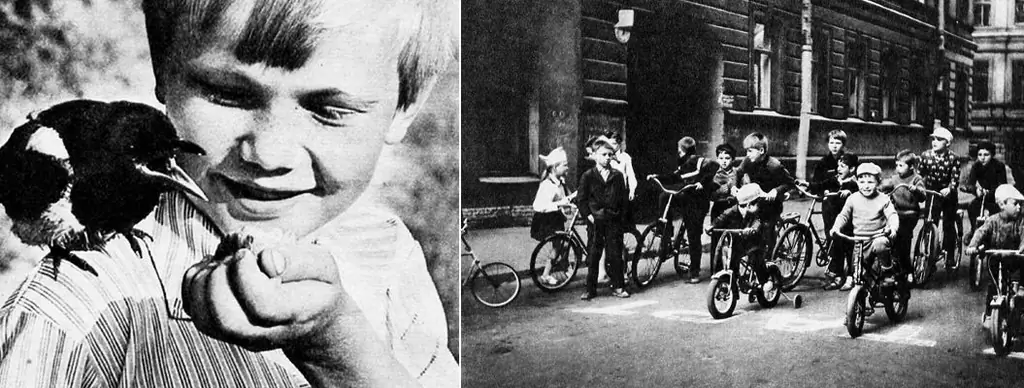
As a result, none of them, orphans and street children, often with a gangster past, slipped back into asocial circles. Such a unique healthy educational atmosphere was created on the basis of the most unpromising children's groups and amazed with its results.
The children left without parents received the lost sense of security and safety from society, from their own collective, built according to the adult principle. They loved and remembered him later all their lives as a family. With attitudes to work for the good of society, they went into life, so they always found their place.
Part 2. When everything is there, except for the main thing






